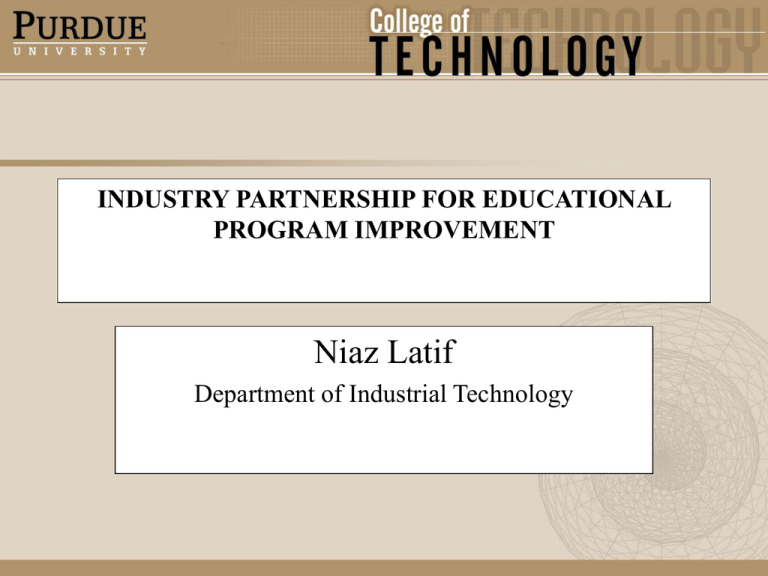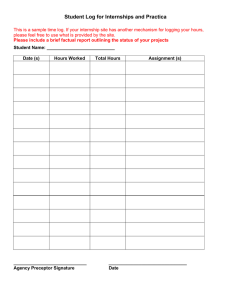CED 363 A.ppt
advertisement

INDUSTRY PARTNERSHIP FOR EDUCATIONAL PROGRAM IMPROVEMENT Niaz Latif Department of Industrial Technology Industrial partnership • Criteria for identifying key industry partners and the role and responsibilities of such partners • Roles and responsibilities of active industrial advisory boards for program improvement, • Integration of employer’s input for continuous improvement of program • Characteristics of student and faculty internship in industry and integration of such internship program in the curriculum. objectives • effective participation by an industrial advisory board • continuous improvement through employers’ input • establishment of key industry partners • faculty and student development through internships in industry. MOTIVATION FOR CONTINUOUS IMPROVEMENT OF THE EDUCATIONAL PROGRAM • To sustain preeminence of the program • To create an academic environment that is conducive to student learning • To provide skills, values, and attitudes to students to enable them to be good employees and good citizens Role of industrial advisory board • Advise on issues related to the learning, discovery, and engagement. • Initiate and develop mutually beneficial partnerships between the department and business, industry, and government. • Develop resources in the form of scholarships, endowments, and gifts-in-kind for student • Provide opportunities for internships and co-op positions and employment opportunities for our graduates. • Contribute in some financial manner to the department. This can be in a variety of capacities, e.g., grants, scholarships, work projects, etc. Employer input integration • To evaluate: – Students mastery of competencies in the field • To identify – Industry needs and required skill sets of graduates – Areas of improvement • To introduce – New and emerging topics Key industry partners • Assist with curriculum improvement through their representative • Provide internships for our students and faculty • Provide funded research projects for our faculty and graduate students • Donate gifts-in-kind for laboratories • Donate cash gifts for student and faculty development, and for student scholarships Faculty/student internships in industry • identify an industry that is willing to provide an internship opportunity to the faculty member • allocate resources to replace the regular faculty member with an adjunct faculty member for one semester of teaching • Defined projects that results in cost saving • Student internship is integrated in the curriculum, however it is not a requirement Some examples • Three new laboratories (Technology Education Biometrics; Supply Chain Management) • Complimentary training of faculty and students to implement new software for the Industrial Distribution program • A faculty internship for one semester (industry cost savings of $300,000) • Several funded graduate student projects • Continuous upgrading of existing laboratories • Participation of guest lecturers • Endowment for students scholarships Summary • Accountability of academic administrators • Active industrial advisory board • Engaged industry partners and long term partnerships • Regular input from employers on graduates’ competencies • Continue to pursue real life experiences through industry internship

